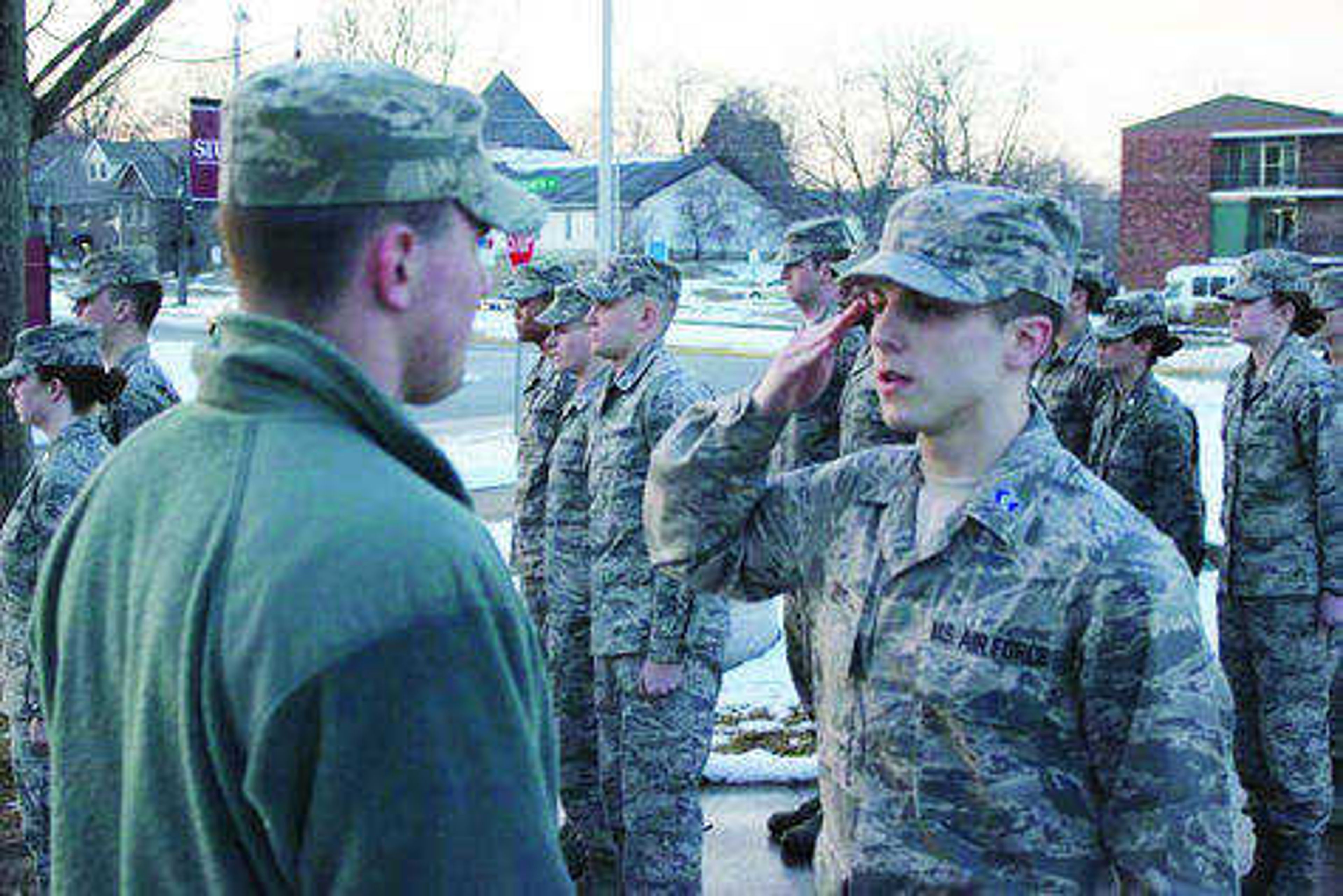The Air Force Reserve Officer Training Corps, or ROTC, on Southeast Missouri State University's campus will face a notable change this year. The national ROTC is expected to reduce its force and has delayed the announcement of the number of cadets that will be allowed to participate in basic training this summer.
The Air Force ROTC is a program that allows students to join the Air Force program while they are in college and vie for a position after their sophomore year to become an officer once they graduate. Students typically begin the program as freshmen in college but can still join as sophomores.
At the end of every cadets' sophomore year, they are pooled with all of the sophomore cadets in the nation and the Air Force ROTC allots each ROTC program a certain number of cadets it can have go through basic training or "drill" the following summer.
At Southeast, the ROTC has a system that ranks cadets based on their grade point average, academic standing, physical fitness levels and other determining factors. When the number of cadets allowed to be selected is announced by the national ROTC, the top ranking individuals are chosen to go on to basic training the following summer for six weeks at the Maxwell Air Force Base in Montgomery, Ala.
"You go through what's called 'field training preparation,'" Justin Sievers, a junior at Southeast and member of the Air Force ROTC program, said. "Basically, there's a field training preparation officer, or a cadet. It's usually someone who's a junior, who basically trains you in all areas through field training and you have to compete with Air Force knowledge, your ability to march, your ability to lead, and all those things kind of add up and that's your competing semester.That's the semester that all the sophomores are in right now. Everyone is kind of watching you at that point."
If the chosen cadets pass through basic training, they continue on through their junior and senior years and keep competing for their positions.
This year, the Air Force is attempting to decrease the number of incoming recruits and has yet to release the final numbers of cadets allowed to go into basic training this summer due to increased deliberation over the class sizes.
"The Air Force is drawing down, so they're trying to figure out what their personnel numbers are going to be in the future, so they don't want to give out slots yet if they don't even know how many they need at each [ROTC base]," Captain Michael Holt, an ROTC instructor at Southeast, said.
Holt said that in an effort to bring down the national numbers of Air Force employees, fewer cadets will be commissioned to go into basic training this summer.
"Normally on average they commission 2,000 cadets United States wide. We're anticipating that there's going to be a drop off of about 500 slots, so about 25 percent," Holt said.
Holt said that the decrease in cadet numbers nationwide is to help make up for the increase in Air Force numbers seen in past years.
"We're just slimming down," Holt said. "What happened was, after 9/11, the Air Force plussed up above their authorized numbers, [which was authorized] by Congress. In a time of war you're allowed to go above your authorizations. But we never drew back, and then our personnel costs were higher than the normal, and with everybody taking budget cuts in every Department of State, DOD [Department of Defense], what-have-you, one of the biggest budget line numbers is that personnel cost. Because you pay them, you've got to pay their housing, you've got to pay for their training and their food and stuff, so that's how the Air Force kind of, at least the way I've always seen it is, they might cut programs, like they may cut an air frame, they might order fewer aircraft, but the biggest thing they cut is manpower."
If students are not selected for the basic training summer program, they can go into "special student status," which means they can enroll in Air Force ROTC classes for academic credit only, and are not allowed to wear the uniform or compete in the program's selection process any longer. If individuals complete their degree under special student status they can go on after graduation and apply to Air Force Officer Training School. There is a separate selection process related to this program.
Holt said that there is a lesser chance for individuals to get into the Officer Training school because those who are applying have to identify with a recruiter why they were unable to obtain a basic training slot while they were cadets in college.
Holt said that people can also enlist in the Air Force rather than going through the college ROTC officer program, but they would begin at the very first level rather than at the elevated officer level in the program.
"I've seen a lot of good things come out of people who are still in the program and people that have even left the program," Sievers said. "It builds a sense of leadership extremely quick."
Holt said that he hopes to have information about the number of cadets that can be selected and sent to basic training by the end of this month.




